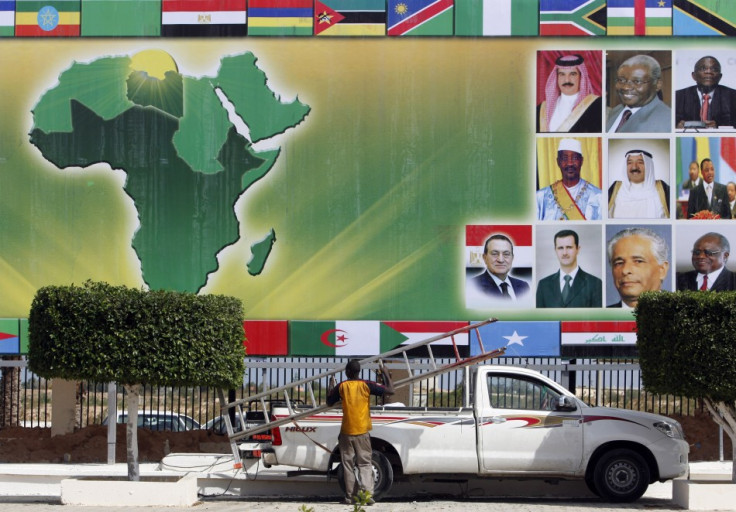Nato's Libya Campaign: The New Face of "Neo-Colonialism"?

Former South Africa's president, Thabo Mbeki, has hinted that that Africa's right to self-determination is still threatened by a "new imperialism", illustrated by the Nato Libyan operation.
Addressing the AGM of the Law Society of the Northern Provinces in South Africa on November 5, Former South Africa's president talked about the "troubling, ominous development in Africa".
From a western point of view, Nato helped protect the Libyan population, as efforts led by the African Union proved ineffective.
For Mbeki however, the Alliance's plan was always accompanied by a will to get rid of Colonel Gaddafi and underpins a mode of thought which sees weaker countries as dependent on stronger countries.
In his speech, Mbeki cited a string of British and American articles supporting the need for a new form of benevolent "neo-imperialism", aimed at restoring order and security.
Among them is an article written in 2002 by Robert Cooper, Tony Blair's former advisor, who is now a member of the European Council on Foreign Relations.
"Today, there are no colonial powers willing to take on the job, though the opportunities, perhaps even the need for colonisation is as great as it ever was in the nineteenth century. Those left out of the global economy risk falling into a vicious circle. Weak government means disorder and that means falling investment...
"What is needed, then, is a new kind of imperialism, one acceptable to a world of human rights and cosmopolitan values. We can already discern its outline: an imperialism which, like all imperialism, aims to bring order and organisation but which rests today on the voluntary principle," the article says.
Echoing the idea that the 21<sup>st century will be the stage of a new 'scramble for Africa', Mbeki pointed out that in addition to surpassing the mandate provided by the UN resolution, the Libyan operation also served as a new form of intervention led by foreign powers.
With no troops on the grounds, it made it harder for its critics to accuse the Alliance of imperialism. After all, the intervening powers argued the the need to respect human rights and to prevent a population from being massacred by its own leader.
"It is clear that the beginning of the peaceful demonstrations in Libya served as a signal to various Western countries to intervene and effect 'regime change'. These countries then used the Security Council to authorise their intervention under the guise of the so-called 'right-to-protect'," the former President said.
However what Mbeki seemed to be particularly upset about is the presentation of the United Nation as an institution seeking to promote peace and resolution of conflicts by using peaceful means while "...in the aftermath of the disappearance of the Soviet Union, and the end of the Cold War, the UN Security Council has been open to abuse with regard to respect for the rule of law and international law."
"It seems obvious that a few powerful countries seek to turn the Security Council into an instrument in their hands, to be used by them to pursue their selfish interests, determined to behave according to the principle and practice that 'might is right", he continued.
He cites as examples the different violations committed during the operation, including the sale of arms to the rebels forces despite an arm embargo and the deployment of military and other personnel to help the anti-Gaddafi forces despite the fact that the resolution firmly stood against "a foreign occupation of any form or any part of Libyan territory."
This anger also appears to stem from an apparent tendency to depict the African Union as financially dependent of Colonel Gaddafi and unable to come up with an effective scheme to lead Libya through a peaceful transition phase before the Alliance's intervention.
The AU he said had come up with a roadmap for the peaceful resolution of the conflict, just a week before the UN 1973 resolution, but the plan was ignored rather than implemented, despite the resolution stating that the Security Council supports the "efforts (of the Special Envoy of the UN Secretary General) to find a sustainable and peaceful solution to the crisis" in Libya.
He also deplored that throughout the conflict the western press remained largely one-sided, describing the situation in a very Manichean way.
Soon after the end of the struggle that turned into a real civil war, however allegations incriminating the rebel forces started to emerge.
Also despite the operation being hailed as a victory, with masses of weapons still circulating and violence still reported, civilians are far from being protected. Many are still internally displaced, and insecurity is also high as lootings and other attacks continue to take place.
Libya is an African country, Mbeki said and as such it remains an African problem. With the proliferation of light arms being one of the continent's major problems and an abundance of armed militias willing to acquire new weapons, the Libyan situation is set to render more than one African leader anxious.
© Copyright IBTimes 2025. All rights reserved.





















